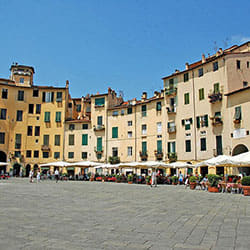Having lived in Milan for many years and knowing a lot about both the good and bad points of Italians, I don't have any problem with this answer. It is said that the character of Northern Italians is a bit different from other Italians in that they're less jovial and more reserved, similar to Northern Europeans. This may be true, but when it comes to the Milanese that I see around me, their character can indeed be summed up in one word: "cheerful".
Even when they're not feeling well, they'll make jokes and kid around, and you'll forget that they are even ill.
This is about the time a while back when I went to the pharmacy for a sick friend of mine. When I opened the box that the medicine came in, there was a small, folded piece of paper inside. Both sides of the paper were covered with fine-print text containing an important explanation of how taking this medicine will make you feel better.

This explanatory paper, called a package insert, is not called as such in Italy and is instead called by a rather shocking name: bugiardino, which translates to "little liar". Even to joke-loving Italians, wouldn't such a harshly worded name raise doubts about the medicine's efficacy or reliability?
I looked into the reason for the naming of this "little liar” – which seems to ask, "Can you really believe these lies?" – but there wasn't a clearly discernable origin as I had hoped.
It is said that the name originated from newspaper posters displayed at Kiosks in Siena, a city in the region of Tuscany, but that alone doesn't really explain it or give a solid answer. According to one theory, since the insert explains not only the medicine's effects but also its side effects and other points of caution, the name was given to emphasize the need to be careful with the medicine. On the other hand, it may also be related to the tendency using fine print to tactfully induce the reader to overlook the details or to even intentionally confuse the reader. While those ideas make sense, neither theory was especially satisfying.
According to a different theory, when the use of medicines first began to spread, the tendency to use more familiar words in the place of medical terminology to prevent confusion among the general public may have led to the coining of the "little liar" moniker. In a recent and easy-to-grasp example, there was an outbreak of encefalopatia spongiforme bovina in the early 2000s. People like me, who lacks the language ability to even remember "Supercalifragilisticexpialidocious" from Mary Poppins, called it by a much simpler name that you will likely remember: mucca pazza, or “mad cow disease”.
Mucca pazza has kind of a fun-sounding ring to it, so it doesn't sound like the name of a disease that shook the world. In a similar way, I think that calling package inserts "little liars" is a reflection of Italians' cheerful tendencies and the idea that there is always a bit of comedy to be found within a tragedy.
Reference: Wikipedia






























































